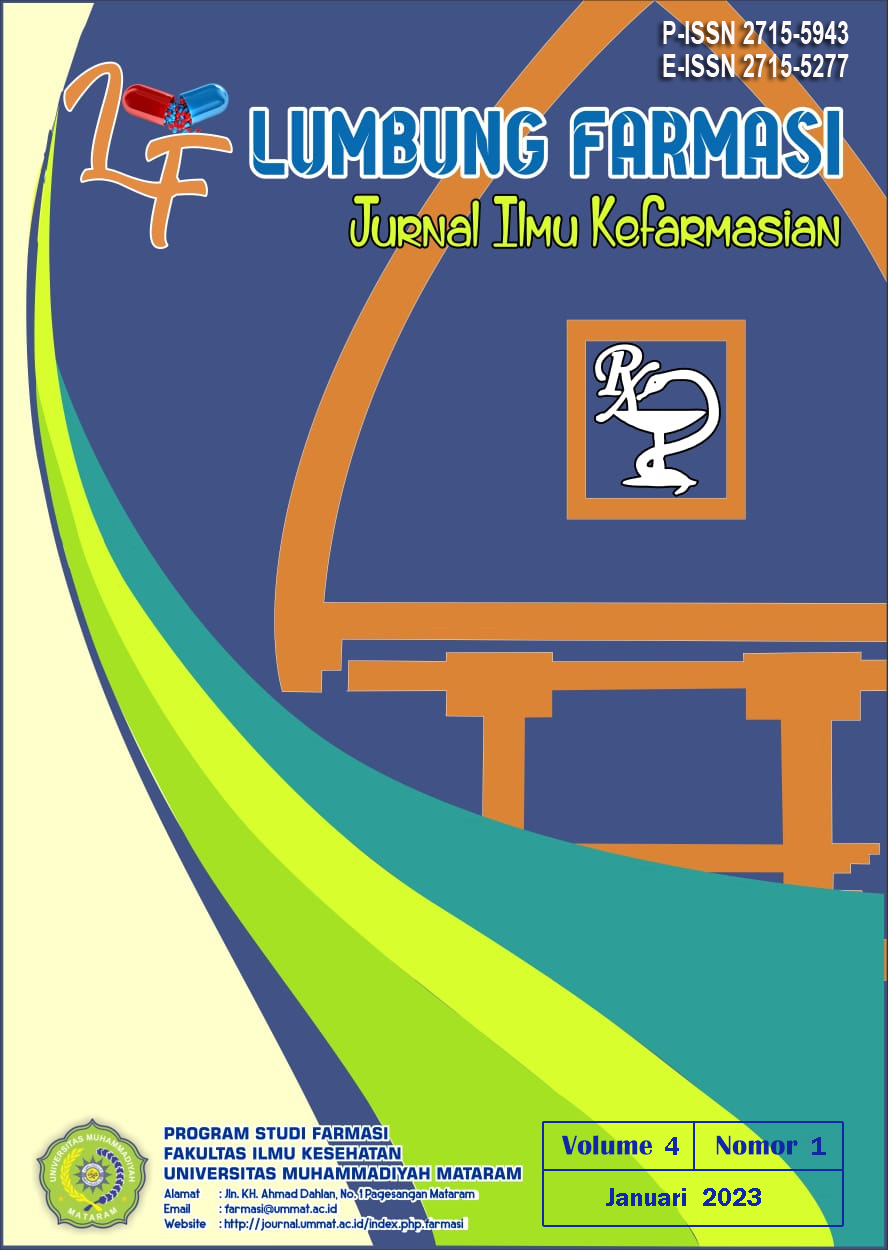Pengetahuan, Sikap, dan Kepatuhan Pasien Hipertensi di Puskesmas Kediri I Tabanan
DOI:
https://doi.org/10.31764/lf.v4i1.12036Keywords:
Pengetahuan, Sikap, Kepatuhan, Hipertensi, BaliAbstract
Hipertensi merupakan masalah yang perlu diwaspadai, karena tidak ada tanda gejala khusus, dan beberapa orang masih merasa sehat untuk tetap beraktivitas seperti biasa. Penelitian bertujuan untuk mengetahui gambaran perilaku minum obat pada pasien hipertensi di Puskesmas. Survei cross-sectional dilakukan terhadap 115 pasien hipertensi dewasa yang berobat ke Puskesmas Kediri I, Tabanan-Bali, pada bulan Maret-Mei 2022. Wawancara menggunakan kuesioner yang divalidasi. Data dianalisis menggunakan software SPSS versi 25.0. Sebanyak 115 pasien berpartisipasi dalam penelitian (tingkat respon 100%). Usia rata-rata responden adalah 59,7 tahun ± 6,86. Separuh responden berusia pada kisaran 55-64 tahun (58 [50.4%]). Lebih dari setengahnya (75 [65.2%]) adalah perempuan. Mayoritas berpendidikan menengah (66 [57.4%]). Seluruh responden mengalami hipertensi grade 2 dan mendapatkan Amlodipine, serta mayoritas terdiagnosa hipertensi kurang dari 5 tahun (70 [60,9%]). Hasil penelitian menunjukkan kriteria pengetahuan responden baik, sikap pada kategori cukup; namun sebagian besar responden tidak patuh dalam pengobatan. Hasil uji Rank Spearman menunjukkan terdapat hubungan yang kuat antara pengetahuan dan kepatuhan (Sig. 2-tailed= 0,000; p<0,05; Correlation Coefficient = 0,675). Sedangkan hubungan sedang ditunjukkan antara sikap dan kepatuhan (Sig. 2-tailed =0,001; p< 0,05; Correlation Coefficient = 0,452). Kepatuhan minum obat hipertensi pada pasien dipengaruhi oleh pengetahuan dan sikap.References
Bays, H. E., Taub, P. R., Epstein, E., Michos, E. D., Ferraro, R. A., Bailey, A. L., Kelli, H. M., Ferdinand, K. C., Echols, M. R., Weintraub, H., Bostrom, J., Johnson, H. M., Hoppe, K. K., Shapiro, M. D., German, C. A., Virani, S. S., Hussain, A., Ballantyne, C. M., Agha, A. M., & Toth, P. P. (2021). Ten things to know about ten cardiovascular disease risk factors. American Journal of Preventive Cardiology, 5(November 2020), 100149. https://doi.org/10.1016/j.ajpc.2021.100149
Begum, M. L., Dhar, S. P., Mahmud, A., Abedin, F., Lima, L. S., & Khan, Z. H. (2017). Knowledge, Attitude and Practice of Life Style Modification in the Management of Hypertension. Medical & Clinical Research, 2(3), 1–4.
Bromfield, S., & Muntner, P. (2013). High Blood Pressure: The Leading Global Burden of Disease Risk Factor and the Need for Worldwide Prevention Programs. Current Hypertension Report, 15, 134–136. https://doi.org/10.1007/s11906-013-0340-9
Chobanian, A. V, Bakris, G. L., Black, H. R., Cushman, W. C., Green, L. A., Izzo, J. L., Jones, D. W., Materson, B. J., Oparil, S., Wright, J. T., & Roccella, E. J. (2003). Seventh Report of The Joint National Committee on Prevention, Detection, Evaluation, and Treatment of High Blood Pressure. Hypertension, 42, 1206–1252. https://doi.org/10.1161/01.HYP.0000107251.49515.c2
Kebede, T., Taddese, Z., & Girma, A. (2022). Knowledge, attitude and practices of lifestyle modification and associated factors among hypertensive patients on-treatment follow up at Yekatit 12 General Hospital in the largest city of East Africa: A prospective crosssectional study. PLoS ONE, 17(1 January), 1–28. https://doi.org/10.1371/journal.pone.0262780
Kemenkes. (2013). Riset Kesehatan Dasar 2013.
Lam, W. Y., & Fresco, P. (2015). Medication adherence measures: An overview. BioMed Research International, 2015(Okt 11), 1–13. https://doi.org/10.1155/2015/217047
Notoatmodjo, S. (2012). Promosi Kesehatan dan Perilaku Kesehatan. PT. Rineka Cipta.
Nuraeni, E. (2019). Hubungan Usia Dan Jenis Kelamin Beresiko Dengan Kejadian Hipertensi Di Klinik X Kota Tangerang. Jurnal JKFT, 4(1), 1. https://doi.org/10.31000/jkft.v4i1.1996
Raimondo, D. Di, Buscemi, S., Pinto, A., Tuttolomondo, A., Musiari, G., Rizzo, G., Pirera, E., & Corleo, D. (2021). Ketogenic Diet, Physical Activity, and Hypertension: A NarrativeNarrative Review. Nutrients, 13(2567). https://doi.org/https://doi.org/10.3390/nu13082567 Department
Roldan, P. C., Ho, G. Y., & Ho, P. M. (2018). Updates to Adherence to Hypertension Medications. Current Hypertension Reports, 20(34).
Sison, J., Vega, R. M. R., Dayi, H., Bader, G., & Brunel, P. (2018). Efficacy and effectiveness of valsartan/amlodipine and valsartan/amlodipine/ hydrochlorothiazide in hypertension: Randomized controlled versus observational studies. Current Medical Research and Opinion, 34(3), 501–515. https://doi.org/10.1080/03007995.2017.1412682
Sobierajski, T., Surma, S., RomaÅ„czyk, M., Åabuzek, K., Filipiak, K. J., & Oparil, S. (2022). What Is or What Is Not a Risk Factor for Arterial Hypertension? Not Hamlet, but Medical Students Answer That Question. International Journal of Environmental Research and Public Health, 19(13). https://doi.org/10.3390/ijerph19138206
Tsioufis, K., Douma, S., Kallistratos, M. S., & Manolis, A. J. (2019). Effectiveness and Adherence to Treatment with Perindopril/Indapamide/Amlodipine Single-Pill Combination in a Greek Population with Hypertension. Clinical Drug Investigation, 39(4), 385–393. https://doi.org/10.1007/s40261-019-00761-0
Wake, A. D. (2020). Knowledge and Attitude of Self-Monitoring of Blood Pressure Among Adult Hypertensive Patients on Follow-Up at Selected Public Hospitals in Arsi Zone, Oromia Regional State, Ethiopia: A Cross-Sectional Study. Integrated Blood Pressure Control, 13(Mar 5), 1–13. https://doi.org/https://doi.org/10.2147%2FIBPC.S242123
WHO. (2013). A global brief on Hypertension: Silent killer, public health crisis. www.who.int/about/licensing/copyright_form/en/index.htmlChobanian, A. V, Bakris, G. L., Black, H. R., Cushman, W. C., Green, L. A., Izzo, J. L., Jones, D. W., Materson, B. J., Oparil, S., Wright, J. T., & Roccella, E. J. (2003). Seventh Report of The Joint National Committee on Prevention, Detection, Evaluation, and Treatment of High Blood Pressure. Hypertension, 42, 1206–1252. https://doi.org/10.1161/01.HYP.0000107251.49515.c2

